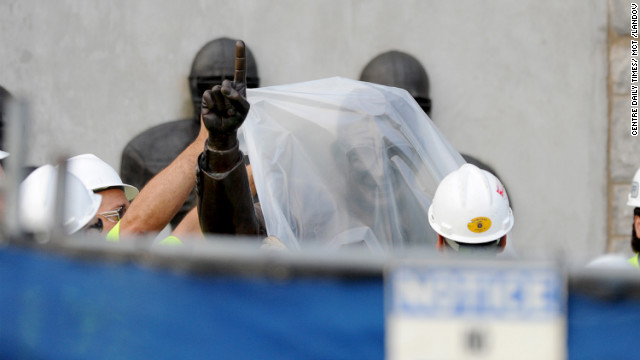My Take: Why Is Ncaa Taking Sex Abuse More Seriously Than Catholic Church?
By Stephen Prothero
Editor's note: Stephen Prothero, a Boston University religion scholar and author of "The American Bible: How Our Words Unite, Divide, and Define a Nation," is a regular CNN Belief Blog contributor. By Stephen Prothero, Special to CNN (CNN) – As a resident of the most Catholic state in the nation (Massachusetts), I have watched for more than a decade as the Roman Catholic Church responded to charges of priestly pedophilia with a troubling combination of procrastination and obfuscation. Far too often, Catholic priests, bishops and cardinals have identified not with abused children but with their “band of brothers,” their fellow priests. In the case of the sex crimes committed by former assistant football coach Jerry Sandusky, officials at Penn State also looked the other way. They must be credited, however, with commissioning a no-holds-barred investigation by former FBI Director Louis Freeh, whose report (PDF) concluded that Penn State officials engaged in a cover-up that allowed Sandusky’s sexual assaults on children to continue for years. They should also be applauded for removing a statue of head coach Joe Paterno, who for far too long was revered as a demigod at Penn State. On Monday, however, the NCAA took the higher road. In a shocking departure from the foot-dragging in Rome, it sided quickly and definitively with the victims. In a harsh ruling, the NCAA banned the Penn State football team from postseason games for four years and took away 20 football scholarships per year for the same period. It also ruled that the university will not receive its portion of conference bowl revenues for those four years. And it fined the school $60 million. Equally significantly, it turned all of Penn State's football wins from 1998 forward into losses, stripping Paterno of his claim to fame as the winningest football coach in NCAA history. These penalties did not include the so-called “death penalty,” which would have shut down the football program for a year or more. But, in truth, this penalty is worse. The NCAA acted boldly to send a message to collegiate athletic programs elsewhere in the United States that neither the sex crimes of Sandusky nor the “see no evil, hear no evil” response of Paterno and other Penn State officials will be tolerated. Still, I wonder whether the message will reverberate even further, perhaps even to the hallowed halls of the Vatican. I was not raised a Catholic, but in my youth I admired the Roman Catholic Church for taking clear stands on the major moral issues of our time – on abortion and war and poverty and capital punishment. I have watched with both sadness and horror as this venerable institution has squandered the moral capital it accrued over centuries in a misguided and un-Christian attempt to wish away a problem that was staring it in its face for decades. Although the Vatican has undertaken nothing like the independent Freeh report to unearth how its institution lost its way, the U.S. Conference of Catholic Bishops did commission an outside report delivered in May by researchers from John Jay College of Criminal Justice in New York. It also weighed a parallel report by lay Catholics of the National Review Board in June. Neither of these documents read anything like the hard-hitting Freeh report, however, and the Catholic Church did not respond to its crisis with either the speed or the firmness of the NCAA. In the Gospel of Luke, at the end of the Good Samaritan story, Jesus tells his followers to “go and do likewise.” That is the NCAA's message to the Vatican.
|
.
Any original material on these pages is copyright © BishopAccountability.org 2004. Reproduce freely with attribution.
